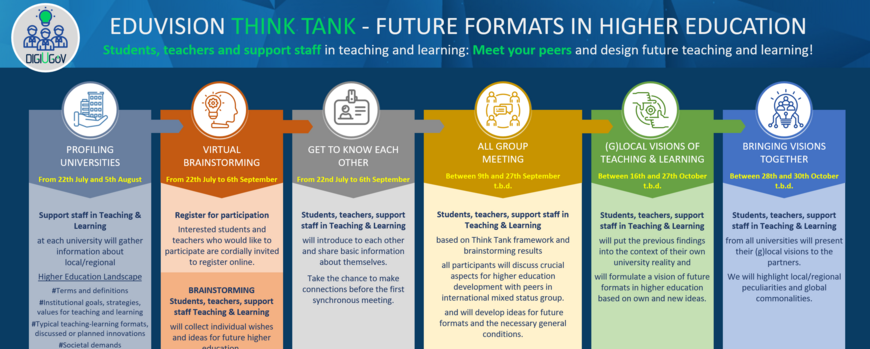
How do we want and need to teach and learn?
Reflection and exchange on the future of higher education
A future-proof higher education is vital due to global challenges, rapid technological advancements, changing labor market demands, and the need for flexible, resilient education systems. Innovative formats can enhance the learning experience, ensure that students acquire relevant skills, and prepare institutions for disruptions like COVID-19. Discussing and developing future formats of teaching and learning is essential for education to remain relevant, effective, and responsive to current and future societal needs.
By "formats" we mean teaching and learning activities that have their own profile or form, their own specific structure and that pursue specific teaching/learning objectives. These activities are associated with particular routines and requirements in accordance with the objectives. Formats of teaching and learning at universities are in particular lectures, seminars, exercises and projects/project weeks, as well as colloquia, excursions, internships or language courses etc. Over time, long-established formats can change and adapt to new conditions and requirements.
STUDENTS, TEACHING STAFF and SUPPORT STAFF for TEACHING-LEARNING
Representatives of these three important status groups from all DigiUGov partner universities are invited to contribute their experiences and ideas for future-oriented higher education teaching to the "EduVision Think Tank: Future Formats of Higher Education".
Goals and process of the Think Tank
This initiative is an important part of the DigiUGov project and pursues a bottom-up and visionary approach. Its various activities aim to:
- analyse the status of teaching and learning regarding 1) widespread formats, 2) strategic anchoring and 3) current (further) developments at the partner universities.
- actively promote the international, inter-institutional and intercultural exchange of knowledge and ideas about development of university teaching with a focus on future teaching and learning formats.
- formulate visions for and characteristics of competence- and future-oriented teaching and learning formats and
- provide impulses and suggestions for the further design of the digital transformation of teaching and learning at our universities.
To this end, the think tank is intended to bring you into an interactive exchange in a blended format (synchronous/asynchronous).
Phases and times
In line with the objectives, the Think Tank is divided into six phases:
The first three phases will be implemented asynchronously, individually (registration/virtual brainstorming, get to know each other) and partly only by one status group (profiling universities).
From September 2024, three synchronous online meetings will follow, two of them with all participants, one internally with the group of the respective partner university. The specific dates will be voted online with all participants from August 20 2024.
The estimated time required for participation in all sessions and activities, including the reception of session preparation materials, is approx. 15 hours.
How to participate? What are the benefits?
All interested STUDENTS, TEACHING STAFF and SUPPORT STAFF for TEACHING and LEARNING are cordially invited to contribute to the Think Tank. There are two ways to participate:
- You would like to actively participate in the entire Think Tank process and get involved in all synchronous and asynchronous activities. After registering, you will receive all important information on participation as well as preliminary results of the respective phases. You will be informed regularly and timely before the start of any activity or session.
- You only want to participate in the "Virtual Brainstorming" and share your wishes and ideas for future teaching and learning formats with the community. After registering, you will receive information about the brainstorming procedure and a link to an online questionnaire. You will be informed about the results of the brainstorming as well as the results of the entire Think Tank process.
Register now!
If you are interested, please fill out the form and select the type of participation you would like. You will receive further information after your registration.
JOIN EduVision Think Tank
Benefits for all participants and certification
Taking part in an international Think Tank is an extraordinary experience itself and can provide valuable experience for everyone involved. As part of the joint work, active participants will:
- broaden their perspectives through exchange across borders (national, cultural, status group, discipline ...).
- gain insights into different systems of higher education in Europe and Latin America.
- learn and exchange ideas with international peers about studying and teaching in different countries and cultures.
- actively participate in the discussion about the development of higher education in an international context.
- establish valuable contacts for potential future cooperation (e.g. research, internships, stays abroad).
After full participation in the Think Tank, all participants receive an official and qualified certificate, wich wil specifythe topics discussed, the format and the various activities. This certificate will be issued by the Tec de Monterrey and the University of Potsdam. It will be delivered electronically and in the form of a badge that can be integrated into social media and electronic portfolios.
About DigiUGov
DigiUGov = Digitalization meets University Governance
Digitalization meets University Governance (DigiUGov) is a capacity building project in higher education funded by the European Commission. Project partners are the Pontificia Universidad Javeriana Cali, the Universidad de Caldas, the Universidad Pontificia Bolivariana Bucaramanga and the Asociación Colombiana de Universidades, ASCUN (Colombia), the Tecnológico de Monterrey and the Universidad de Guadalajara (Mexico), the Universitat Jaume I (Spain) and as project lead the University of Potsdam (Germany).
This project aims to improve institutional support for academic staff in teaching in digital formats, the exchange of resources such as training courses and the digitalization of administration in Latin American and European higher education institutions. The DigiUGov project mainly focuses on digital transformation as a common challenge and opportunity in teaching and administration at the participating institutions.
Learn more about the project: DigiUGov.com





